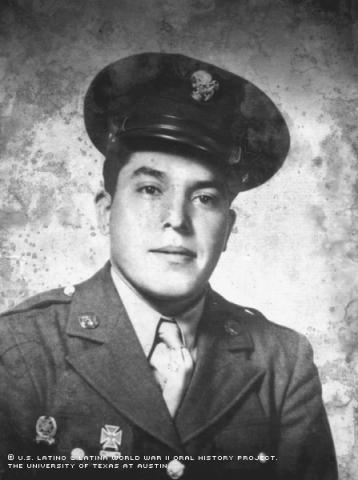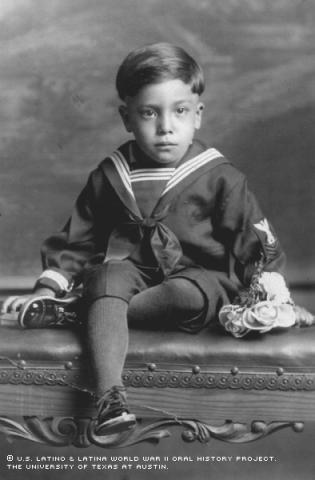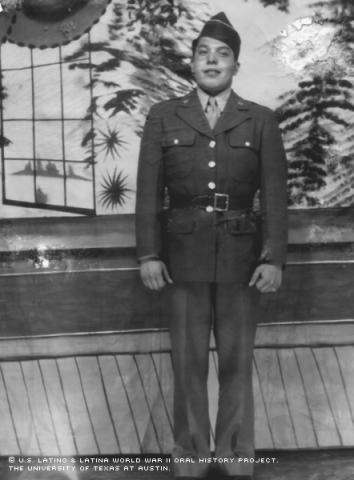


By Anthony Sobotik
Carmen Gonzalez has shouldered his responsibilities with grace
Gonzalez was milking cows at a neighbor's farm to help support his family by the time he was 12. And during World War II, he did his duty on the battlefield. Last but not least, when the mother of his eight children left the country after they divorced, he did his best to raise them.
Gonzalez was one of 19 children born to José Gonzalez, a foreman for the Santa Fe Railroad Company, and Ylaria Rincon. Both of his parents were natives of Mexico. Jose’s job with the railroad brought them to the United States.
The Gonzalez family lived in a small house in Newton, Kan., in an area called "ranchito," which was populated by Mexicans and Mexican Americans working for the railroad. Discrimination against them was commonplace, Gonzalez says.
As a youth, he can remember going to the movies and being placed in the "non-white" section; some restaurants refused service to Latinos.
"We couldn't even go to a restaurant to get a hamburger," he said.
Nevertheless, Gonzalez made his own way. At age 12, he began working on a farm, making 75 cents a week. By the time he was 17, he had a job working with his father for the Santa Fe Railroad. He says he worked because he wanted to help out his family.
"It helped, you know," he said. "That money could buy some meat, milk; something."
During this time, Gonzalez also managed to make his way through Newton High School. He even attended Hutchinson Community College in Hutchinson, Kan., for three months, but had to leave because the commute was too far.
He found out the U.S. was going to war one day after he came out of a theater with his brother.
"We heard these guys yelling 'Extra! Extra!'" he said. "I thought, 'Oh my God; we're gonna get drafted.'"
Gonzalez was right. He was drafted just weeks later and sent to Camp Chaffee in Arkansas for training, at which point his knowledge of the Spanish language came in handy: He taught many of the other white soldiers to speak the language, gaining their respect in the process.
Gonzalez was then sent to Camp Butner in North Carolina, where he learned to use the 81-mm mortar. Shortly thereafter, he was asked to train 100 men to use the same weapon. Before he knew it, he was promoted to Sergeant.
Gonzalez was next asked to become a sniper for the Army, but declined the offer for one main reason:
"I was scared," said Gonzalez with a laugh.
He was sent overseas to France in November of 1944. Gonzalez and the members of his 78th Infantry Division were immediately sent to the front line to fight the Germans. He still remembers the first time he lost one of his men.
"I thought I would be next," he said. "But I was never wounded."
In all, Gonzalez was in Europe for a little more than 18 months. While there, he managed to a have a bit of fun as well, taking a short trip with his men to Belgium.
"I rented a house to fit us all," he said.
Although he’d experienced discrimination at home in Kansas, Gonzalez says he encountered almost no prejudice while in the Army.
"We were all together," he said. "A group."
After the war ended, Gonzalez was asked to go to Berlin to train more men, but there weren't enough soldiers to train once he arrived. He remained in Europe for six months before returning to the U.S. When he was discharged as a Technical Sergeant in 1946, he received several commendations, including a Good Conduct Medal, EAME Theater Ribbon with three Bronze Service Stars, Bronze Star, Distinguished Unit Badge by the 78th Division, WWII Victory Medal and American Theater Ribbon.
Gonzalez returned to the States in January of 1946 and relocated to Chicago, Ill. He made a living by working at various jobs. While he was living in Chicago, he met Norma Maldonado, a friend of his buddy's girlfriend, at a club. He asked her to dance and she declined, so he decided to try a different strategy: He pretended to be interested in her friend, in the hopes of making Norma jealous.
It worked. The two were soon married after a brief courtship.
The couple took up residence in Newton and had eight children: three boys and five girls. Gonzalez continued to work for the railroad and Norma stayed at home to care for the children.
According to Gonzalez, after the couple had been married for 17 years, however, she wanted to return to her native Puerto Rico, and she wanted Gonzalez and the children to come with her. Gonzalez refused and the two were divorced. Norma returned to Puerto Rico, while Gonzalez remained in Newton and became a single parent.
Gonzalez never remarried because he says he didn't want to take away from the love he had for his children.
"I got burned once," Gonzalez said. "And I wanted all my love for my kids."
Mr. Gonzalez was interviewed in Newton, Kansas, on August 1, 2003, by Nicole Cruz.

